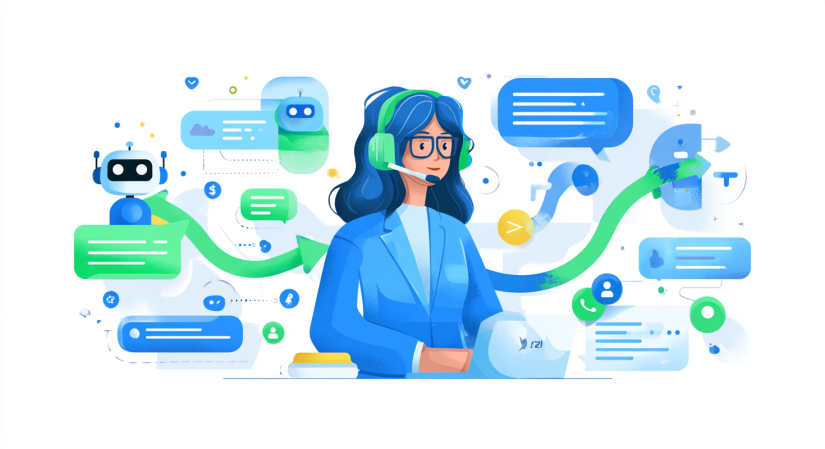Call centers are the front lines of customer interaction and brand representation. Despite their critical role, many call centers struggle with high turnover rates, inconsistent customer service, and inefficient training methods.
This is where the power of call center coaching can make a substantial difference. Leveraging advanced tools like Automated Coaching and Learning Management Systems (LMS) can revolutionize your call center operations, making your team more competent, confident, and consistent.
You can unlock unparalleled growth and efficiency by integrating cutting-edge sales coaching techniques and automated solutions.
Now imagine every sales coach has access to real-time performance data, every training session is personalized, and every agent has the skills to excel.
This isn't a distant dream—it's the future of coaching in a contact center, and it’s here now.
A healthtech client of Convin implemented call auditing and automated coaching for nearly two months, resulting in a 16% increase in agent call scores.
Let’s dive into how automated coaching and LMS can transform your call center team into a productivity and customer satisfaction powerhouse.
Take a tour of Convin’s automated call center coaching and LMS
The Importance of Call Center Coaching
Let's face it: working in a call center can be tough, with constant customer queries and pressure to resolve issues quickly. That's where call center coaching can be a game-changer.
Well-coached agents handle situations efficiently, leading to happy customers and repeat business. Coaching makes call center agents feel valued, reducing burnout and encouraging longer tenure.
Regular coaching helps agents improve continuously, resulting in a productive team delivering top-notch performance. It ensures consistency, maintains high-quality service, and earns customer trust.
Coaching also keeps your team updated with the latest strategies to tackle new challenges. Plus, it boosts morale with regular feedback, making for a happy, motivated team. In short, contact center coaching transforms call center agents into confident, skilled professionals, ensuring excellent service daily. Investing in coaching is investing in your team’s success.
Benefits of Call Center Coaching

Call center coaching offers many benefits that can transform your team and enhance performance. Here’s why investing in coaching is a smart move:
- Improved Customer Satisfaction: Well-coached agents handle customer interactions more effectively, leading to higher satisfaction rates. They are better equipped to resolve issues swiftly and professionally, creating positive customer experiences.
- Higher Agent Retention: Effective coaching makes agents feel valued and supported, reducing burnout and turnover rates. A supportive environment encourages agents to stay longer, building a more experienced and cohesive team.
- Increased Productivity: Regular coaching helps identify and address performance gaps, enabling agents to improve continuously. This results in a more efficient team that consistently meets and exceeds targets.
- Consistent Service Quality: Coaching ensures that all call center agents follow the same standards and protocols, leading to uniform service quality. This consistency is crucial for maintaining brand reputation and customer trust.
- Enhanced Adaptability: The business landscape is ever-changing, and coaching helps agents stay updated with the latest information and strategies. This adaptability is essential for effectively handling new products, services, and processes.
- Development of Future Leaders: Coaching call center agents improves current performance and helps identify and nurture potential leaders. This creates a pipeline of skilled individuals ready for future management roles.
- Boosted Morale and Motivation: Regular feedback and recognition through call center agent coaching can significantly boost agent morale. When agents see their progress and receive positive reinforcement, they become more motivated and engaged.
The Role of Automated Coaching in Call Centers
Automated coaching in contact centers leverages advanced technology to provide agents with real-time feedback and personalized training.
This innovative approach enhances traditional coaching methods using data analytics and AI to identify performance gaps, offer targeted recommendations, and track progress.
Automated coaching ensures consistent, efficient, and scalable training, improving agent performance, increasing customer satisfaction scores, and reducing turnover.
Key Features
- Personalized Training Plans: Tailors a coaching session based on individual agent performance and needs.
- Peer-to-peer coaching and Auto-Assigned Coaching: Creates coaching sessions automatically based on best-performing snippets from one agent to another.
- Data-Driven Insights: Uses analytics to identify trends and areas for improvement.
- Automated Progress Tracking: Monitors and records agent development over time.
Impact on Call Center Coaching
Automated coaching transforms the landscape by offering consistent, objective, and timely feedback, leading to faster skill development and performance improvements. It reduces supervisors' manual workload, allowing them to focus on more strategic tasks. By integrating automated coaching, call centers can ensure that every agent receives the support they need to excel, resulting in higher efficiency and customer satisfaction.
This blog is just the start.
Unlock the power of Convin’s AI with a live demo.

Learning Management Systems (LMS) for Call Centers
Learning Management Systems (LMS) are crucial in modern call centers as they streamline training processes and enhance agents' overall learning experience. An effective LMS provides a centralized platform for managing and delivering educational content, tracking progress, and ensuring all agents can access the necessary resources for continuous improvement.
Key Features of an Effective LMS

- User-Friendly Interface: An intuitive and easy-to-navigate interface ensures that agents can quickly access and utilize training materials without technical difficulties.
- Knowledge base: Provides a comprehensive repository of information and resources, enabling agents to access necessary data and improve performance.
- Assessment: Implements continuous evaluation and feedback mechanisms to track agent progress and identify areas for improvement.
- Manual Coaching: Offers personalized coaching sessions to address specific skill gaps and enhance overall agent performance.
Benefits of Learning Management System

In summary, a robust LMS is essential for effective call center training. It offers numerous features and benefits that enhance learning, improve agent performance, and contribute to overall operational efficiency.
- Consistent Training: An LMS ensures that all agents receive the same high-quality training, leading to uniformity in service delivery and knowledge.
- Increased Efficiency: Automates administrative tasks related to training, freeing up time for supervisors to focus on coaching and development.
- Scalability: Easily scales to accommodate a growing team, ensuring new hires and existing agents can access training materials immediately.
- Flexibility: This feature allows agents to complete training at their own pace and on their own schedule, enhancing work-life balance.
- Enhanced Performance: Continuous access to training resources and regular updates help agents stay informed and improve their skills, leading to better performance.
- Cost-Effective: Reduces the need for in-person training sessions and associated costs, making training more affordable and accessible.
- Employee Engagement: Engaging training materials and interactive elements keep agents motivated and invested in their professional development.
Enhance call center coaching experience
Integrating Automated Coaching and LMS

Integrating automated coaching with a Learning Management System (LMS) can enhance the training and development of your call center team. Here’s a step-by-step guide to achieving a seamless integration:
- Assess Your Needs: Start by evaluating your current training and coaching programs to identify gaps and areas for improvement. Determine what specific features of automated coaching and LMS will address these needs.
- Select Compatible Platforms: Choose an LMS and automated coaching tools that are compatible and can easily integrate. Look for platforms that offer robust APIs and support seamless data sharing.

- Define Clear Objectives: Establish what you aim to achieve with the integration. Objectives might include improving agent performance, reducing training time, or increasing customer satisfaction. Clear goals will guide the implementation process.
- Develop Unified Content: Create or adapt training content to be compatible with the LMS and the automated coaching system. Ensure the content is relevant, engaging, and designed to address the identified needs.
- Implement Gradually: Begin with a pilot program to test the integration on a small scale. This helps identify potential issues and gather customer feedback for improvements before a full-scale rollout.
- Leverage Data Analytics: Utilize the data and analytics provided by the automated coaching tool to tailor training programs within the LMS. This ensures that the training is personalized and addresses specific performance gaps.
- Train Your Trainers: Ensure supervisors and trainers use both systems well. Provide comprehensive training sessions to help them understand how to maximize the benefits of the integrated platforms.
- Communicate with Your Team: Explain to your team the benefits of the new integrated system. It will make their training more effective and support their professional growth.
- Monitor and Optimize: Continuously monitor the integration's effectiveness. Use Negative and positive feedback and performance data to make ongoing adjustments and improvements. Regularly update the training content to keep it relevant and engaging.
- Scale Up: Once the pilot is successful and any issues have been addressed, scale up the integration to include all agents. Ensure ongoing support and training to help your team fully leverage the integrated system.
Effective Sales Coaching Techniques Enhanced by Technology

Sales coaching is a vital component of developing a high-performing sales team.
Integrating technology can significantly enhance these coaching techniques, leading to better outcomes for both agents and the organization. Here are some effective sales coaching techniques that are amplified by technology:
1. Real-Time Feedback and Analysis

Providing immediate feedback on sales calls and interactions is crucial for helping agents correct mistakes and refine their techniques on the spot. With AI-powered tools, this process becomes even more effective.
These tools can transcribe calls, analyze the tone and language used, and provide instant insights into how the conversation went. This allows sales agents to receive actionable feedback right after their calls, enabling them to make quick adjustments and improve their performance in real-time.
The immediacy of this feedback loop ensures that learning is continuous and directly tied to their everyday activities, making the coaching process more dynamic and impactful.
2. Personalized Training Programs
Tailoring coaching sessions to the unique needs of each sales agent is essential for practical skill development. Technology enhances this by leveraging data analytics from CRM systems and performance metrics to identify areas where an agent needs improvement. Automated coaching platforms can then deliver personalized training modules that address these gaps.
For instance, if an agent struggles with closing deals, the system can assign targeted training materials focused on closing techniques. This personalized approach ensures that agents receive the training they need, making their development more efficient and relevant to their challenges.
3. Role-Playing and Simulations
Role-playing exercises are a staple of sales training, allowing agents to practice scenarios they might encounter in real-life situations. Technology takes this to the next level with virtual reality (VR) and augmented reality (AR) simulations.
These immersive environments can replicate various sales scenarios, from handling objections to negotiating deals, providing a safe space for agents to practice and refine their skills.
The realism of VR and AR simulations helps agents build confidence and competence, as they can repeatedly practice difficult situations without the pressure of a real sales call. This high level of interactivity and engagement makes learning more effective and enjoyable.
4. Gamification
Motivating agents through competitive and rewarding activities can significantly enhance their engagement and productivity. Gamification introduces elements like leaderboards, badges, and rewards into the training process.

Sales agents earn points and recognition for completing training modules, achieving milestones, or demonstrating improvements in their performance. This competitive aspect taps into the natural desire for achievement and recognition, making the training process more engaging and fun.
Gamified training platforms keep agents motivated and focused on their goals, fostering a healthy competitive spirit and encouraging continuous improvement.
5. Microlearning Modules

Breaking down training into small, manageable lessons makes learning more digestible and less overwhelming for sales agents. Mobile learning platforms deliver these microlearning modules, allowing agents to complete short, focused lessons at their own pace and on their own time.
This flexibility ensures that training can fit into their busy schedules without disrupting their work. Microlearning modules reinforce key concepts and skills through repetition and practice, enhancing retention and application. This approach aligns with how people naturally learn and retain information, making training more effective.
6. Video Coaching
Using recorded sales interactions for review and critique is a powerful coaching technique. Video coaching platforms enable agents to record their sales pitches and receive detailed feedback from coaches.
These platforms often include annotation tools and playback features that allow coaches to highlight specific areas for improvement. Agents can watch their recordings, understand their mistakes, and see where to improve. This visual feedback is incredibly effective for helping agents refine their techniques and better understand what works and what doesn’t.
Video coaching provides a tangible way for agents to track their progress and see their development over time.
7. Automated Progress Tracking

Monitoring and tracking the development of sales skills over time is essential for ensuring continuous improvement. LMS and coaching software automate this process by monitoring agents' progress through training programs and generating comprehensive reports and dashboards.
These tools highlight strengths, weaknesses, and overall development, providing agents and coaches valuable insights into performance trends. Automated progress tracking ensures that no aspect of an agent’s development is overlooked, enabling targeted interventions and more personalized coaching.
This data-driven approach helps make informed decisions about future training needs and strategies.
Overcoming Challenges in Implementing Automated Coaching and LMS
Implementing automated coaching and an LMS in a call center can present several challenges, but these can be effectively managed with the right strategies:
- Resistance to Change: Employees may be hesitant to adopt new technologies. To overcome this, clearly communicate the benefits, provide thorough training, and involve agents in the implementation process to gain their buy-in.
- Integration Issues: Technical difficulties can arise when integrating different systems. To address this, choose compatible platforms and work closely with vendors to ensure smooth integration and ongoing technical support.
- Data Privacy and Security: It is crucial to ensure compliance with data privacy regulations and implement strong security measures. Choose systems that prioritize data protection and conduct regular audits to safeguard sensitive information.
- Cost Concerns: The initial investment can be substantial. Focus on the long-term return on investment by highlighting how these tools can improve efficiency, reduce turnover, and enhance performance, ultimately leading to cost savings.
- Training and Adoption: Comprehensive training is essential for successful adoption. Provide continuous support and resources to help employees become comfortable with the new systems and fully utilize the technology.
- Measuring Effectiveness: Establish clear metrics to evaluate the implementation's success. Regularly review these metrics and gather positive and negative feedback to make necessary adjustments and improvements.
Getting Started with Call Center Coaching and LMS for Your Team
Implementing call center coaching and an LMS can transform your team's performance, morale, and customer experience. Integrating advanced technologies and personalized training programs can address performance gaps, reduce turnover, and ensure consistent, high-quality service.
By thoroughly assessing your needs and choosing the right tools, you can create a scalable, flexible training system that keeps your agents engaged and continually improving.
Remember, clear communication, comprehensive training, and continuous monitoring and optimization are key to success. Your call center can become a powerhouse of productivity and excellence with the right approach.
Get started by evaluating your current training needs and exploring the best solutions for your business.
Frequently Asked Questions
1. What is meant by coaching a sales team?
Coaching a sales team involves guiding, training, and mentoring sales representatives to improve performance, develop skills, and achieve sales targets.
2. What is sales management coaching?
Sales management coaching is where sales managers provide ongoing support, feedback, and training to their sales team to enhance their sales techniques and overall productivity.
3. What is call center coaching?
Call center coaching focuses on improving the performance and skills of call center agents through regular feedback, training sessions, and performance reviews to ensure high-quality customer service.
4. What are the 3 C's of coaching?
The 3 C's of coaching are Clarity, Communication, and Consistency. These principles help set clear goals, maintain open communication, and provide consistent feedback.
5. What is coaching in customer service?
Coaching in customer service involves training and mentoring customer service representatives to enhance their skills, improve customer interactions, and ensure high customer satisfaction.
6. How do you coach soft skills in a call center?
Coaching soft skills in a call center involves role-playing scenarios, providing constructive feedback, offering training sessions on communication, empathy, and problem-solving, and continuously reinforcing positive behaviors.








.avif)